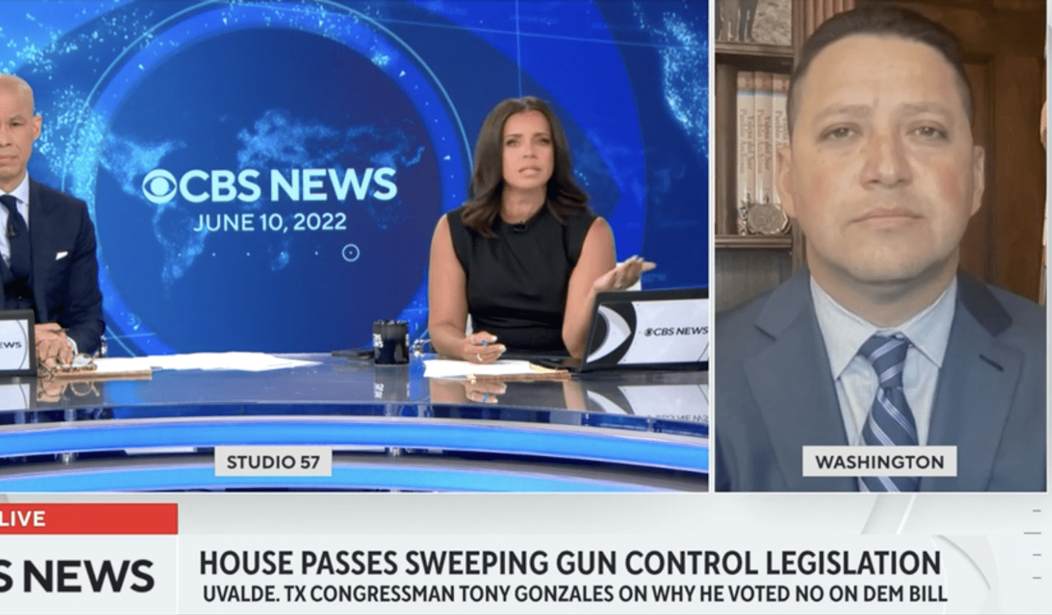The nine anti-gun proposals passed by the House this week attracted the support of five Republicans, but Rep. Tony Gonzales, whose district includes the town of Uvalde, Texas where 19 fourth graders and two teachers were murdered last month, wasn’t among them. The Republican, who’s currently in his first term after a 20-year career in the U.S. Navy and stints as a Department of Defense fellow in Sen. Marco Rubio’s office and teaching political science at the University of Maryland, joined CBS News on Thursday to talk about the shooting and the aftermath, as well as why he didn’t sign on to the Democrats’ gun control package.
While the tone of anchors Anne-Marie Green and Vladimir Duthiers was civil, Green left no doubt where she stands on gun control when she started quizzing the congressman on his vote.
“You voted no on the Democrats’ “Protecting Your Kids Act”. It includes raising the age to purchase semi-automatic rifles from 18 to 21. You know, I see on your Twitter feed that you posted, ‘listen, I represent the people of Texas and the people of Texas don’t want more restrictions.’ But I’m gonna point out a poll to you from the Texas Politics Project. You know they’ve been polling people for a really long time and they asked about whether stricter gun laws should be enacted. 44% said ‘yes.’ So a huge chunk of the people you represent said ‘yes.’ Why don’t you support this proposal?”
To his credit, Gonzales did not remind Green that 44% is not a majority, instead pointing out that two Democrats (Jared Golden of Maine and Oregon’s Kurt Schrader) also voted against the measure, and said that he’s not in favor of any legislation that “infringes on lawful gun owners, period.”
Gonzales went on to say that he’s taking a different approach by focusing on mental health, and offered several specific proposals that he says would be a more targeted approach to preventing these types of attacks.
“I am for grants. I think in particular mental health grants. These community clinics are very important, especially in rural communities. Telemedicine. That’s an area we need to expand on. You’ve got stop school violence grants that work. There are programs that are already in place like the COPS program that I think we need to expand upon, not to mention legislation like the EAGLES Act and the Luke and Alex Act that I think are bipartisan areas that we should focus on.”
Green tried to interrupt Gonzales at least twice during his response, and when he finished she immediately jumped in to declare that “I think all those things are good, but when we look at the case in Uvalde, you know, more mental health intervention wouldn’t have helped in this case. This is not a guy who was on the radar.”
Well, if he wasn’t on the radar then a red flag law wouldn’t have made a difference either, would it? And yet that was a part of the House Democrats gun control package.
I think Green is wrong about the killer in Uvalde not being on anyone’s radar. Friends and family both talked about escalating behavior over the past couple of years, including cutting himself, shooting at people with BB guns, and hurting animals. There was plenty in his behavior to set off alarm bells, and yes, ensure that he was receiving mental health treatment.
The CBS anchor wasn’t finished debating Gonzales, however, adding “You talked about a lot of these policies already being in place. Yes, they are already in place, and they didn’t work.”
I think Gonzalez was waiting for her to ask an actual question, because it took him a second to respond. When he did, he was much more polite than I would have been at that point.
“It’s a great point,” the congressman replied. “I mean, the truth is this gunman should never have been able to purchase a weapon; not because he was 18 but because he was mentally unstable. This is where we need to look at how do we get extensive background checks to find out these juvenile records. This person had a very long history of mental health illness and he didn’t just wake up that day and decide to murder innocent people. This is part of, I think, the solutions. You know, I was speaking to a colleague of mine, Eric Graves, the other day and he goes ‘Hey Tony, you know why are all the gunmen always men? Why aren’t we researching why that’s the case? So I think that’s an opportunity. Let’s put some money into researching why aren’t women shooting up schools and what is the difference there?”
At that point it was Duthier’s turn to interrupt the congressman to “ask” another lengthy statement; this time asserting that the United States is the only country in the world that sees violence like this take place before asking Gonzales why that (false statement) is the case.
“I think that’s a hard question to answer,” Gonzales said as Duthier interjected with an “Is it? It is?”
“I think that’s what everyone should be asking,” the congressman continued. “What I don’t want to do is I don’t want to infringe upon responsible gun owners. Look, my grandfather taught me how to handle a weapon as a child. I joined the Navy at 18-years old. I’m 20-years old in Afghanistan handling a weapon daily. A lot of that is training. I think this is another area where we can incorporate it, but I go back to mental health. I mean, beyond the school shootings and the violence, I would argue there is a rising crisis in America in regards to mental health; whether it’s depression, whether it’s anxiety, COVID certainly didn’t help, so I don’t think we can go wrong if we decide to expand the mental health area. And I also think we can save lives if we would have identified this person had problems as a juvenile I guarantee you no one would have wanted to sell that person a firearm. That’s what we need to get at. Get preventive, not reactive.”
Having failed to convince Gonzales of their assumed error of his ways, the anchors then ended their conversation with the congressman.
It certainly sounds like Gonzales is open to opening up juvenile records to the National Instant Check System when young adults purchase a firearm, but that’s about as far as he’s willing to go on guns. The Republican talked about the need to expand mental health resources, for instance, but never once mentioned “red flag” laws, which typically don’t involve any mental health help after an individual has been ruled “dangerous” by a judge.
I thought Gonzales acquitted himself well during the interview, but I can’t say the same for the CBS anchors, who were more interested in trying to rebut him than actually listening to what he had to say. You can check out the interview for yourself here, but I have to warn you that you’re likely get as annoyed and frustrated as I was with the pontificating and punditry from what are supposed to be unbiased and professional journalists.









